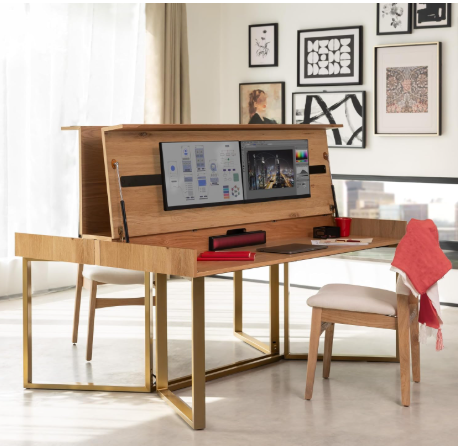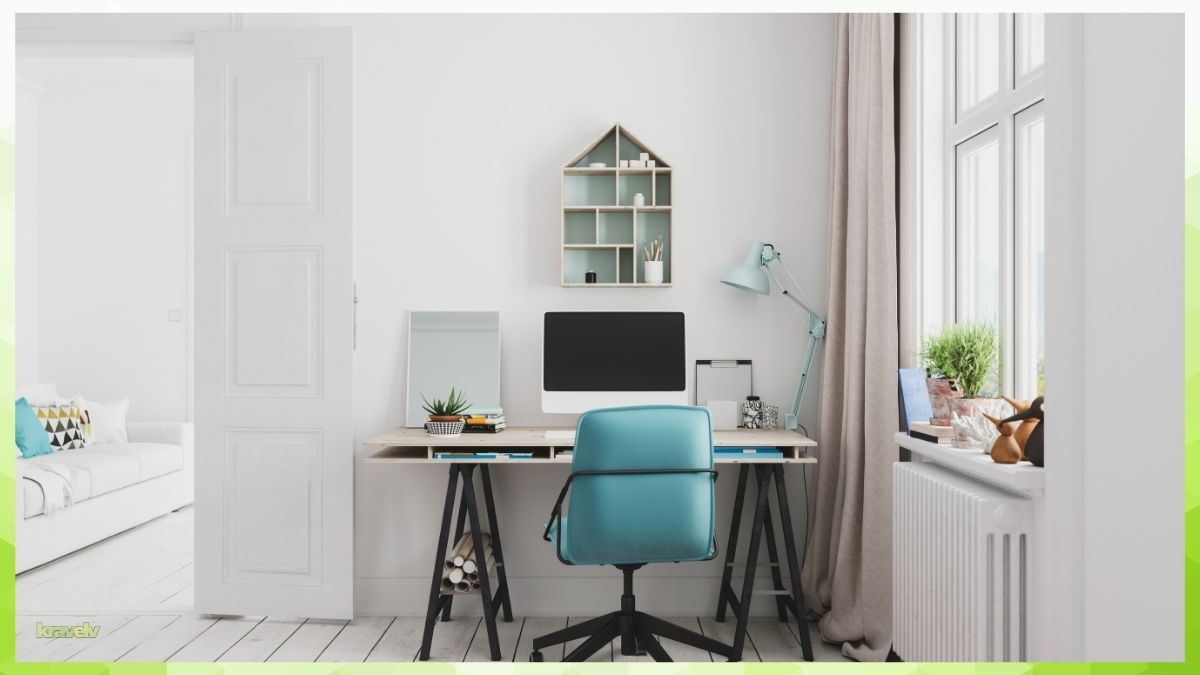Last Updated on April 12, 2025 by Kravelv Spiegel
So, you’re working from home—but your “office” is a wobbly kitchen chair and a corner of your dining table. Sound familiar? You’re not alone. Creating a home office that actually boosts your focus without draining your bank account might feel impossible, but here’s the truth: it’s totally doable. You don’t need a Pinterest-perfect setup to get real work done—you just need a smart plan, a little creativity, and a few budget-friendly tweaks. Let’s build a space that works for you—no stress, no splurge.
💡Key takeaways:
- You can set up a functional, comfortable home office without spending a lot by repurposing what you already have and prioritizing essentials.
- Smart organization, lighting, and layout choices significantly impact productivity more than expensive gear.
- Simple DIY upgrades, secondhand finds, and free digital tools help create a space that supports both focus and comfort.
- Managing distractions, maintaining boundaries, and taking care of your health are just as crucial as your desk or chair.
Why a Dedicated Home Office Matters
The Psychology of Space and Productivity
Ever tried working from your couch and ended up watching cat videos for two hours straight? Yeah, you’re not alone. Your brain connects certain spaces with certain activities. A dedicated workspace helps your mind shift into “work mode” without needing gallons of coffee.
Separation of Work and Life
Blending your bed with your office is a fast track to burnout. Even if it’s just a tiny corner, giving your work zone a physical boundary helps you log off mentally when the day ends.
- Use a second browser profile for work.
- Turn off work notifications after hours using app timers or Focus Mode.
Setting a Realistic Budget
Assess Your Current Finances
Before you grab your Amazon wishlist, look at your bank account. How much can you really afford? Even $100 can go far with the right mindset.
Identify Must-Haves vs. Nice-to-Haves
Do you need a $300 chair or just something better than a wobbly stool? List your essentials: a desk, chair, light source, and basic tech. The rest can wait.
Choosing the Right Location in Your Home
Finding Quiet Corners
You don’t need a whole room. A quiet nook in the bedroom, hallway, or even a closet (yes, a “cloffice”) can do the trick. Noise-free = stress-free.
Utilizing Unused Spaces
Got a guest room nobody uses? That dining table that’s more “storage” than “dining”? Boom—potential workspace.

DIY Desk and Furniture Ideas
Reuse and Repurpose Existing Furniture
That old kitchen table collecting dust in the garage? Perfect desk. Got some crates? Stack ‘em into a bookshelf.
Budget-Friendly DIY Desk Ideas
Two filing cabinets + a sturdy board = a solid desk setup. Or go vertical with wall-mounted folding desks.
Seating Solutions That Won’t Break the Bank
Ergonomic on a Budget
You don’t need to drop hundreds for good posture. Add a back pillow to a decent chair, or grab a seat cushion for $15. Comfort first, brand names later.
Second-Hand Finds That Work
Check Facebook Marketplace, Craigslist, or local thrift stores. You’d be surprised how many people are practically giving away office chairs.
Smart Tech Without the Splurge
Affordable Laptop and Monitor Options
You don’t need the latest MacBook. Refurbished laptops or Chromebooks can handle Zoom, Docs, and basic browsing just fine. Pair it with a cheap external monitor for more screen real estate.
Must-Have Gadgets Under $50
A laptop stand, wireless mouse, and external keyboard can majorly boost comfort. All three together? Under $50 if you shop smart.
Power Backup or Surge Protection
- Invest in a basic surge protector ($10–$20) to protect devices.
- If power outages are common, consider a mini UPS for Wi-Fi routers.
Lighting Hacks for Comfort and Focus
Natural Light is Free
Set up near a window. Natural light boosts mood, reduces eye strain, and costs exactly $0.
Cheap Lighting Tricks That Work
LED desk lamps with adjustable brightness are cheap and effective. Or string up some fairy lights for a cozy vibe.
📖Also Read: Home Office Lighting Tips to Instantly Boost Mood and Focus
Organizing Your Space on a Dime
DIY Storage Hacks
Use cereal boxes covered in wrapping paper for file organizers. Shoeboxes? Perfect drawer dividers.
Dollar Store Organization Ideas
You can grab bins, trays, cable organizers, and wall hooks—all for a buck each. Don’t underestimate your local dollar store.
Cable Management
Messy cables can hurt aesthetics and productivity.
- Use binder clips, zip ties, or toilet paper rolls to organize cords.
- Mount a power strip underneath your desk to free up space.
Noise Control Without Insulation
Soft Furnishings for Sound Dampening
Add a rug, curtains, or even hang up a quilt behind your chair. These soak up echo and help muffle outside noise.
Noise-Canceling Alternatives
Can’t afford high-end headphones? Try earplugs, white noise apps, or even a fan for steady background noise.
Creating the Right Ambience
Affordable Decor Ideas
Print some free art, add a small plant (real or fake), or hang a corkboard with your favorite quotes. Little things, big vibe.
Personalizing Without Overspending
Use items you already own—photos, travel souvenirs, or even your kid’s artwork. Your space, your story.
Fresh Air and Focus
- Open windows when possible for ventilation.
- Budget air purifier alternatives: Place houseplants like snake plants or pothos that naturally clean the air.
Boosting Wi-Fi and Connectivity Cheaply
Low-Cost Wi-Fi Extender Tips
Got spotty internet in your corner office? Basic Wi-Fi extenders cost $20-$30 and can make a huge difference.
Router Placement Tricks
Move your router to a central spot. Sometimes just elevating it off the floor can boost your signal dramatically.
📖Also read: 5GHz vs 2.4GHz Explained: Faster Internet or Better Range?
Time Management Tools That Are Free
Best Free Productivity Apps
Try Trello for tasks, Clockify for time-tracking, and Notion for note-taking. All free. All awesome.
Other free tools for remote teams:
- Slack (free version) for chat
- Zoom (free tier) for calls
- Google Meet for unlimited calls with Gmail users
DIY Whiteboard Calendar
Can’t afford a planner? Use an old photo frame as a dry-erase board and map out your week with markers.
Keeping it Clean and Clutter-Free
Declutter First, Then Design
Start by removing everything you don’t need. Less mess = more mental clarity.
Simple Maintenance Habits
End each workday by spending 2 minutes tidying up. It makes tomorrow way easier.
📖Also Read: How to Declutter Your House in One Day
Motivation and Mindset Boosters
Visual Boards and Affirmations
Create a vision board with goals, quotes, and images that inspire you. It’s like a Pinterest board, but real.
Creating a Routine You Love
Routines = habits = success. Build one that feels natural, not forced. Morning coffee, 10 minutes of planning, deep work time—it’s your call.
Final Touches and Mistakes to Avoid
Overbuying Early On
Don’t go on a shopping spree just because you’re excited. Start with basics. Add on as needed.
Forgetting Comfort Essentials
Think footrests, a cozy blanket, even a mini heater in winter. Comfort makes productivity sustainable.
Staying Healthy While Working from Home
Working from home often means sitting more and moving less. That can mess with your body, your focus, and your long-term health.
Take Microbreaks
Use the Pomodoro method: work for 25 minutes, then take a 5-minute break. Stand up, stretch, walk around—just move.
Protect Your Eyes
Your screen is draining your energy, even if you don’t realize it. Follow the 20-20-20 rule: every 20 minutes, look at something 20 feet away for 20 seconds. Your eyes will thank you.
Watch Your Posture
You don’t need a $200 ergonomic chair. A rolled-up towel at your lower back works. Raise your screen to eye level (use books or a laptop stand) to avoid neck pain.
Handling Distractions at Home
Family. Pets. Noise. Life. Working from home has perks, but distractions come free with it.
Manage Kids with Structure
If you’ve got little ones, give them their own mini “desk.” Fill it with coloring books, toys, or puzzles to keep them busy while you work.
Tame Your Pets
Walk your dog before big meetings. Give your cat a cozy box beside your desk. A tired pet = a quiet workday.
Create Boundaries
Close the door. Put up a sign. Let people know when you’re in “focus mode.” Even headphones can send a message: “I’m working.”
FAQs
1. What’s the cheapest way to make a home office?
Repurpose furniture you already have, set up near a window, and use dollar-store items for organizing.
2. Can I make a good home office in a small apartment?
Absolutely! Even a corner of your room or a closet can become an efficient workspace with the right setup.
3. Do I need expensive equipment to be productive?
Nope. Focus on comfort and functionality. Basic tech and good habits beat fancy gear any day.
4. How do I stay focused working from home?
Set a routine, limit distractions, and create a dedicated space that helps you mentally “clock in.”
5. What’s the best free app for home office productivity?
Trello is great for task management, while Notion offers an all-in-one workspace that’s customizable and free.
Final words
You don’t need a Pinterest-perfect office to be productive. You need a space that works for you—your budget, your home, your life. Whether it’s a DIY desk in a corner or a closet turned command center, the key is to start small and keep improving. Comfort, focus, and creativity don’t come from fancy gear—they come from intentional choices.

